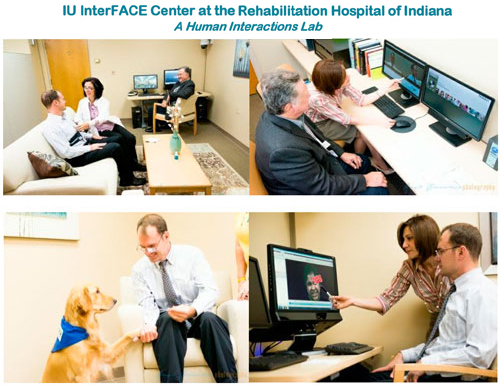IU InterFACE Center opens – uses BIOPAC to assess emotion and behavior
IU InterFACE Center at RHI
The Interactive and Functional Assessment of Communication and Emotion Center is a natural observation laboratory designed to research emotional and behavioral deficits in patients with neurological, psychological, and developmental disorders, in order to develop evidence-based treatment approaches.
It houses a combination of the newest, state-of-the-art equipment that no other lab in the world has to offer all in one place: audio-video equipment to record subject behavior and interpersonal interactions; wireless physiology equipment, eye-tracking, automated facial expression analyses software, and an immersive virtual reality system.

“Subjects’ physiological responses, such as ECG, impedance cardiography, finger pulse, galvanic skin response (systemic arousal), respiration, and EMG can be monitored wirelessly during interpersonal interactions, or while completing activities on the computer. This wireless system is a huge advantage, as participants can feel more comfortable and natural during these recordings. The physiologic recordings can be synchronized with the audio-video, facial expression, and eye-tracking recordings, so that the physiologic responses are linked with behavioral events.” – see BioNomomadix Wireless Physiological Monitoring
“Virtual reality has become an increasingly popular method for evaluating a variety of skills and treating an assortment of deficits, in numerous populations with emotional, physical, and cognitive disorders. Immersed in a 3D world of different scenes and scenarios, virtual reality provides a unique ecologic and naturalistic environment that is safe and controlled. The system allows for 3D customization to be synchronized with physiological recordings.” – see Virtual Reality – Immersive Solutions
For more information on the IU InterFACE Center, click here for an overview or contact 317-329-2000
Stay Connected